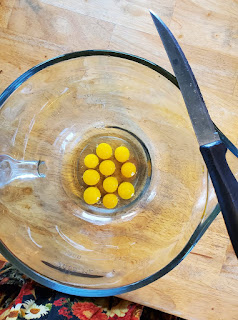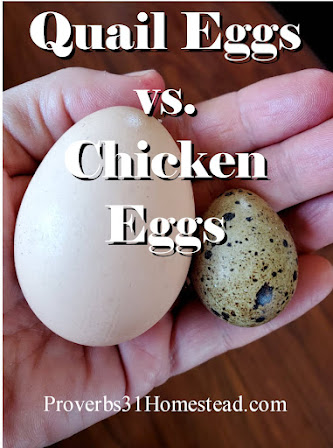This post may contain affiliate links. As an Amazon Associate, and at no cost to you, I earn from qualifying purchases made through some links. Please see FCC disclosure for full information. Thank you for supporting this site!
Quail are the hot homestead poultry right now...and for good reason: They take up so little space, almost anyone can raise them. (For more reasons to raise quail, check out "How and Why to Raise Coturnix Quail.") But a common question readers are asking me is: How are quail eggs different from chicken eggs? Do they taste different? Do they have different nutritional value? Are they healthier? In short: Why should I eat quail eggs?
On this topic, there are a lot of bad answers on the internet. (Are you surprised??) Some people make pretty wild claims about how wonderful quail eggs are. And don't get me wrong: They are wonderful. But they aren't a cure for cancer, folks. So today I'm going to get real about how quail eggs and chicken eggs differ and why you may wish to consider eating one over the other.
Quail Eggs vs. Chicken Eggs: Taste
I think I can safely assume we all know what chicken eggs taste like. Or at least, in North America, we all know what grocery store, factory farm chicken eggs taste like. However, if you've never tasted pastured chicken eggs, or even backyard eggs where chickens roam a reasonably large chicken run, you're missing out! Not only do the eggs taste so much better than store bought, but they are healthier, too. (More on that in a minute.) So if you've never eaten pastured eggs, I encourage you to run down to your local farmer's market for some.
But compared to either grocery store or backyard chicken eggs, will quail eggs taste different? My kids say no, but every adult I know who has tried quail eggs says yes. I think this is because the ratio to egg white and egg yolk in quail eggs leans more heavily to yolk. This means quail eggs taste more buttery and have a creamier texture, too.
Quail Eggs vs. Chicken Eggs: Production
How many eggs a single chicken hen lays depends upon breed, age, and time of year. But on average, a good laying hen gives about 300 eggs per year. Coturnix quail hens, however, lay at least one egg per day (sometimes two!) and, in my experience, lay far better during the winter months, when even my Australorps (who lay better than most breeds during the darkest days of the year) aren't laying well.
Of course, you have to consider egg size, as well. A Coturnix quail egg is a little bigger than a cherry tomato (about 10 to 14 grams). A typical chicken egg weighs about 50 grams. Therefore, it takes about 5 quail eggs to equal 1 chicken egg.
 |
| Quail lay more eggs, but it takes more of their eggs to make a recipe. |
Quail Eggs vs. Chicken Eggs: Storage Life
Both chicken and quail eggs should be stored unwashed in order to keep the natural "bloom" on them. This bloom protects the egg from bacteria and air, keeping it fresher (and healthy) longer. Unwashed chicken eggs stored in the refrigerator last at least six months. Unfortunately, quail eggs, while still safe to eat at the one month mark, will taste stale.
Quail Eggs vs. Chicken Eggs: Nutrition & Health
Despite some radical claims on the Internet, quail eggs are pretty comparable to chicken eggs when it comes to nutritional content. However, quail eggs do contain, per gram, considerably more Vitamin A, Vitamin B12, folate, choline, calcium, iron, phosphorus, and omega 3 fatty acids.
It's important to note, however, that the only scientific data we have about egg nutrition is based upon factory farm eggs. Pastured eggs, or eggs from poultry who are allowed to scratch the earth for bugs and plants, or even eggs from animals given scraps of greens, have a more impressive nutritional profile. As far as I know, no one has ever studied caged quail eggs vs. quail eggs from birds kept on the ground, but several years ago, Mother Earth News did a study showing pastured chicken's eggs had four times more omega 3s and four to six times more vitamin D than conventional chicken eggs. I think it's safe to assume eggs from quail fed more than just pellets contain better nutrition, too.
 |
| Store bought egg (left) and backyard raised egg (right). |
At this point, I also think it's important to address how healthy eggs are for human consumption. Unfortunately, many doctors are still preaching that cholesterol in food causes increases of cholesterol in the body. Yet this hypothesis has repeatedly been shown false. For example, in 2018, in a peer reviewed, scientific journal called Nutrients, one researcher said, "The current literature does not support the notion that dietary cholesterol increases the risk of heart disease in healthy individuals." The author went further to recommend egg consumption, adding, "eggs are the only dietary source of cholesterol that is low in saturated fatty acid but is also nutrient-dense, economical and affordable." So many studies reach the same conclusion that the scientific advisory panel for the 2015 Dietary Guidelines for Americans said, “Cholesterol is not considered a nutrient of concern for over-consumption.”
I would also point out that even if it were true that dietary cholesterol caused cholesterol in the body, I would not personally be concerned. That's because scientific studies are popping up all over the world showing that higher cholesterol levels in the body are linked not to heart disease, but to longer life. For instance, a study from Japan found that "mortality is highest in the lowest cholesterol group without exception." Studies from The Netherlands and Finland have had similar results.
And...some people will complain that eggs contain too much sodium. For decades, doctors, the media, and (ironically) processed food manufacturers have pushed the idea that sodium is bad. However, the truth is that sodium is an absolutely essential nutrient. Without sodium, our other electrolytes fall out of balance. Eventually, our bodies literally crash without sodium. The key is to get the right amount of sodium and from natural foods (such as eggs) instead of from processed food. The FDA recommends 2,300 mg of sodium per day.
Comparing Common Eggs
Finally, I thought it would be interesting to compare chicken and quail eggs to other common North American poultry eggs. Notice that I've compared 100 grams of each type of egg, since these eggs vary a lot in size. I also wanted to include guinea fowl eggs, but unfortunately nobody has thoroughly studied their nutrient content. They are presumed to be pretty similar to chicken eggs, but our best study shows guinea eggs are 10 - 13% protein, 32% fat (making them higher fat than chicken eggs but less fatty than duck eggs), and - since they tend to eat a lot of bugs - their nutrient profile is thought better than factory farm chicken eggs.
Related Posts
Disclaimer:
I am not a doctor, nor should anything on this website
(www.Proverbs31Homestead.com) be considered medical advice. The FDA
requires me to say that products mentioned, linked to, or displayed on
this website are not intended to diagnose, treat, cure, or prevent any
disease. The information on this web site is designed for general
informational purposes only. It is not intended to be a substitute for
qualified medical advice or care. There are no assurances of the
information being fit or suited to your medical needs, and to the
maximum extent allow by law, I disclaim any and all warranties and
liabilities related to your use of any of the information obtained from
the website. Your use of this website does not constitute a
doctor-patient relationship. No information on this website should be
considered complete, nor should it be used as a substitute for a visit
to, consultation with, or the advice of a physician or other qualified
health care provider.
















so I just read this and it is fascinating. the one thing that I wonder about is your data for chicken eggs... so is the data on your table comparing factory raised chicken eggs with your quail and duck eggs, or is it comparing backyard raised chicken eggs with the quali and duck eggs?
ReplyDeleteGreat question! I think it's safe to say they were looking at animals raised on commercial feed. So if your animals get free-range time or supplemental things like mealworms, the nutrition will look a bit different. There are just too many variables in free-range animals to get a standard measure.
ReplyDelete